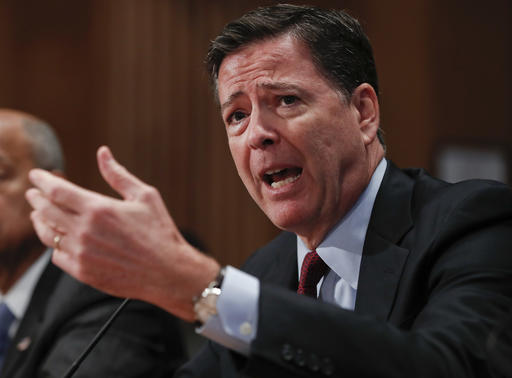Official: FBI knew for weeks about newly discovered emails

In this Sept. 27, 2016 file photo, FBI Director James Comey testifies on Capitol Hill in Washington. The longtime Hillary Clinton aide at the center of a renewed FBI email investigation testified under oath four months ago she never deleted old emails, despite promising in 2013 not to take sensitive files when she left the State Department. (AP Photo/Pablo Martinez Monsivais, File)
WASHINGTON — FBI investigators in the Anthony Weiner sexting probe knew for weeks about the existence of newly discovered emails potentially related to the investigation of Hillary Clinton’s private email server, a law enforcement official said Sunday.
In his letter that roiled the White House race, FBI Director James Comey said he was briefed last Thursday about that development. He told Congress on Friday that the bureau had found emails in an unrelated case that might be relevant to the Clinton inquiry.
The emails were found on a device that belonged to Weiner, the estranged husband of close Clinton aide Huma Abedin.
A second law enforcement official also said the FBI was aware for a period of time about the emails before Comey was briefed, but wasn’t more specific.
The officials were not authorized to discuss the matter by name and spoke on condition of anonymity.
The timing of Comey’s letter just 11 days before Election Day drew criticism from Democrats and some Republicans who cast it as unprecedented and potentially tipping the scales in the presidential race in favor of Republican Donald Trump.
Energized by the news, the GOP presidential nominee has rallied his supporters, calling the latest developments worse than Watergate and arguing that his candidacy has the momentum in the final days of the race.
“We never thought we were going to say ‘thank you’ to Anthony Weiner,” Trump said in Nevada.
Trump also highlighted reports that the Justice Department had discouraged the FBI from alerting Congress to the unexpected discovery of the emails, and said the department is trying “so hard” to protect Clinton.
Clinton’s use of a private email server while secretary of State has dogged her campaign since early last year. In July, Comey recommended against criminal prosecution after a months-long investigation, but rebuked Clinton and her aides for being careless with classified material.
Justice Department officials who were advised of the FBI’s intention to notify Congress about the discovery expressed concern that the action would be inconsistent with department protocols designed to avoid the appearance of interference in an election.
In an apparent departure from the wishes of top Justice Department leaders, Comey acted independently when he sent several members of Congress a letter about the emails on Friday, according to the official, who was not authorized to discuss internal deliberations and spoke on condition of anonymity.
The move creates the potential for a divide between the Justice Department and Comey, who has served in government under both Democratic and Republican presidents.
It was not immediately clear what the emails were about or what significance, if any, they carried to the email investigation. Nor was it clear when agents would complete the process of reviewing the recovered emails, and Comey made no guarantees that would happen before Election Day.
The newly discovered emails were on a device seized during a sexting investigation of disgraced former New York Democratic Rep. Weiner.
A person familiar with the investigation, who lacked authority to discuss the matter publicly and insisted on anonymity, said the device that appears to be at the center of the new review was a computer that belonged only to Weiner and was not one he shared with Abedin.
As a result, it was not a device searched for work-related emails at the time of the initial investigation. The person said it is “news to (Abedin)” that her emails would be on a computer belonging to her husband.
Abedin told lawyers in June in a deposition that, like millions of internet users who don’t manage their inboxes, she never deleted old emails on her devices, either at work with Clinton or at home with Weiner.
“I didn’t have a practice of managing my mailbox other than leaving what was in there sitting in there,” Abedin said. “I didn’t go into my emails and delete State.gov emails. They just lived on my computer. That was my practice for all my email accounts. I didn’t have a particular form of organizing them. I had a few folders, but they were not deleted. They all stayed in whatever device I was using at the time or whatever desktop I was on at the time.”
In February 2013, Abedin signed a routine State Department document under penalty of perjury in which she promised to “turn over all classified or administratively controlled documents and materials” before she left her government job, and promised that she was not retaining copies, “including any diaries, memorandums of conversation or other documents of a personal nature.”
Abedin and Weiner separated this year after Weiner was caught in 2011, 2013 and again this year sending numerous woman sexually explicit text messages and photographs of himself undressed. Federal authorities in New York and North Carolina are investigating online communications between Weiner and a 15-year-old girl.